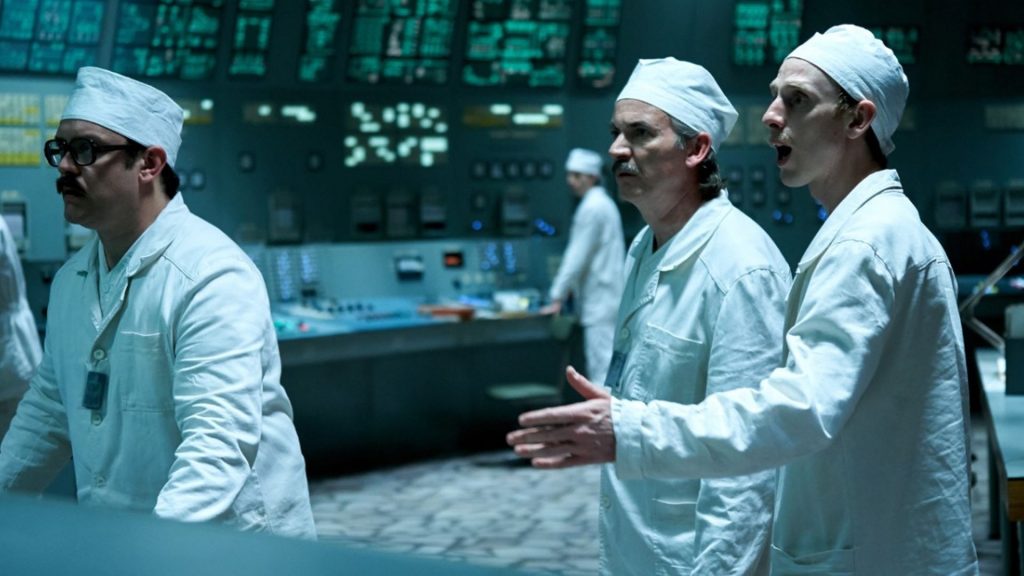Chernobyl took the Internet by storm with its bleak portrayal of a national disaster and the way bureaucrats attempt to stifle it. However, it’s also a relentlessly humanistic story, where not only the main cast, but countless people came together to help in the aftermath of the biggest nuclear disaster in history.
The miniseries is anchored by scientists Valery Legasov (Jared Harris), Ulana Khomyuk (Emily Watson) and bureaucrat Boris Scherbina (Stellan Skarsgaard). Once Legasov sees reports of graphite on the ground following the explosion, he pushes for a more urgent response. Partnered with Shcherbina, Legasov begins the long cleanup process, from putting out the fire to preventing water pollution from the leftover radiation. Shcherbina transforms from a career bureaucrat into a man of convictions, while Legasov eventually finds himself stuck between a rock and a hard place, forced choose between the truth and his survival.

The show highlights the human cost of the disaster pretty well, through characters such as the pregnant wife of a fireman and a soldier assigned to a team that searches the abandoned houses near Chernobyl to kill the irradiated pets that still remain. There’s also something inexplicably human in the whole cleanup effort itself. Like Legasov says at one point, they tried to fix something that has never happened before. There is a point in the show where liquidators are sent to the roof in 90-second-bursts to shovel the remaining graphite over the edge. It feels as tense, if not more, as a moon landing mission.
Of course, the show also strongly criticizes the ineptness of not only the operators and higher officials in charge of the nuclear power plant, but the Soviet administration itself.
This is done subtly for the most part, but it’s overt enough that Russians have decided to make their own version of the show to tell the story from their perspective. Of course, there are plenty of new powerful nuclear stations, like the Rooppur Power Plant, that could still face disaster. While the main design flaw in Chernobyl was eventually fixed throughout Russia, it took the actual death of Legasov to spur the government to action. And like Legasov said, the Chernobyl RMBK reactors had this flaw in the first place because “it was cheaper” to build it that way.
“It’s about the cost of lies,” Chernobyl creator Craig Mazin told Entertainment Weekly. “It’s about what happens when a culture and a government and a people begin to lose touch with the importance of the truth, and when that happens, there are costs. You may be able to get away with it for a while, but sooner or later it’s going to get you, and we are all of us right now living through a time when the truth is being manipulated and distorted and almost made fun of. The idea of truth is being laughed at. And that’s what Chernobyl is about, it’s about the cost of that, because it’s real.”
Mazin also stressed that most of the people that night in the control room were, in essence, innocent. “They just didn’t know. Even the villain in the room to some extent was kind of innocent, and that’s kind of a shocking thing. And so it’s all about kind of driving home for the people watching that this is, we are all of us, every day of our lives, in a control room facing choices, and we’re being asked to consider, well, if something bad happens, in this case one theory is why worry about something that isn’t going to happen? And another theory is, how about we do worry about it because it might happen? And that’s prudent, and we should do that.”
Of course, Chernobyl is a tad bit overhyped, but it’s an earnest show, shot with unrelenting focus and a refreshing earnestness. Even if you start the show skeptical of the hype, the bleakness and human heart at the core of the series will win you over in a short time. Jared Harris and Stellan Skarsgaard turn in powerful, understated performances, and their mutual understanding- which eventually blossoms into a begrudging friendship- is the anchor of this series.
Will disasters like this happen again in the near future? Like the KGB head says, you can just not worry about something that’s unlikely to happen. But in the event that it does happen, there’s hope that men of Legasov and Shcherbina’s caliber can rise to the occasion.